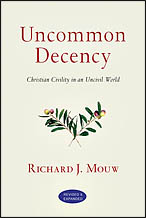
Civility requires that we reduce the psychological distance between ourselves and others. We need to develop a sense of commonality with people who initially strike us as very different from ourselves. One important means of doing this is by cultivating empathy.
“Empathy” literally means “in-feeling” — it is to project myself into another person’s feelings so that I begin to understand what it is like to have his experiences. If I want to gain empathy for a neighbor who is consistently defensive and insulting, I can try to imagine what it is like to be torn by the hurts and fears that give rise to his antisocial behavior. In doing so I may find links between his inner life and my own; or I may use my imagination to explore feeling that I myself have never experienced directly.
Obviously, we cannot develop empathy toward each of our fellow citizens on a one-to-one basis. But we can cultivate empathic sensitivies toward people in general by concentrating on some of our commonalities.
I’m highlighting the need for empathy here because I believe that the enlargement of our empathic sensitivities is an important part of becoming more human. When we break out of the bonds of self-centeredness, entering into the experiences of other people, we come closer to fulfilling God’s puposes for human beings. and we become more Christlike, since the incarnation is the ultimate ministry of empathy: “For we do not have a high priest who is unable to sympathize with our weaknesses, but we have one who in every respect has been tested as we are, yet without sin” (Hebrews 4:15).
Empathy is good for our character development, but that is not its only value. It is also important for our evangelistic efforts. Christian groups that empahsize the need for “relational evangelism” recognize this point. They know that forming genuine friendship with unbelievers — so that we enter into their lives in order to learn about their uniquely individual hopes and fears — establishes a healthy basis for introducing them to the person and the work of the Savior.
The quest for empathy can be helped along by a good dose of curiosity. . . . — Richard J. Mouw, Uncommon Decency: Christian Civility in an Uncivil World (Revised and Expanded, InterVarsity Press, 2010), 58-59.

Yes, I am having difficulty putting down the revised and expanded edition of Uncommon Decency. Not surpising as the original was valuable for framing and addressing cultural “polarizations” as expressed on campus when I began my missional labors with InterVarsity at Carnegie Mellon University (1996). FYI: I remember purchasing the original at the huge Urbana Student Missions Conference book store in the Armory at the University of Illinois Champaign-Urbana.
Today, I find the revised and expanded edition very insightful as I consider the call of Emerging Scholars to be marked by “Open Hearts”:
- empathy
- curiosity
- teachability
- learning from unbelief.
AND the importance of nurturing the spiritual underpinnings of civility as we seek to love our academic neighbors in a godly manner:
- zeal
- shalom
- spiritual work
- “art appreciation”
- hospitality
- self-critique
- a heart for the suffering.
When you have a few moments, I encourage you to pray for an “open heart” and the “spiritual underpinnings of civility” to mark not only your life, but also the life of other Christians (and Christian fellowships) on campus. Yes, love God with your head, heart, and hands in a manner which flows into loving your neighbor and the very creation we have been called to steward. To God be the glory!
Stay tuned for one more quote/reflection from Uncommon Decency before turning to some material drawn from Richard J. Mouw’s inspiring exploration of Revelation 21-22 found in When the Kings Come Marching In: Isaiah and the New Jerusalem (Wm. B. Eerdmans Publishing. 2002).
Note 1: A follow-up to “The Lordship of Christ” (Richard J. Mouw) and The Day for “Uncommon Decency” has come. Let’s embrace it! The series concludes with “Uncommon Decency” in the context of Pluralism.
Note 2: If you desire to pick-up a copy of Uncommon Decency for summer and/or fall reading, be sure to use the 30% ESN Member Discount on InterVarsity Press (IVP) publications. If you have a book discussion group with interest in reviewing Uncommon Decency for ESN, please let me know.
Tom enjoys daily conversations regarding living out the Biblical Story with his wife Theresa and their four girls, around the block, at Elizabethtown Brethren in Christ Church (where he teaches adult electives and co-leads a small group), among healthcare professionals as the Northeast Regional Director for the Christian Medical & Dental Associations (CMDA), and in higher ed as a volunteer with the Emerging Scholars Network (ESN). For a number of years, the Christian Medical Society / CMDA at Penn State College of Medicine was the hub of his ministry with CMDA. Note: Tom served with InterVarsity Christian Fellowship / USA for 20+ years, including 6+ years as the Associate Director of ESN. He has written for the ESN blog from its launch in August 2008. He has studied Biology (B.S.), Higher Education (M.A.), Spiritual Direction (Certificate), Spiritual Formation (M.A.R.), Ministry to Emerging Generations (D.Min.). To God be the glory!

Great topic and speaker. I’ve blogged previously on the need for Evangelicals to be more sensitive to orthopathy: http://www.patheos.com/Evangelical/Generous-Orthopathy-John-Morehead-01-08-2013.html.
Reelated to this, I’ve also blogged on the need for cognitive empathy in a post at http://johnwmorehead.blogspot.com/2013/11/cognitive-empathy-in-interreligious.html which included this quote from Anderson Campbell:
When most people think of empathy, they often think of a kind of emotional mirroring. When you see someone in distress and you feel badly for that person, you are empathizing with them. This is affective empathy. It is the ability to recognize what the other is feeling and respond appropriately. We often characterize this kind of empathy as soft and passive, largely emotive. Contrast this with cognitive empathy, which is the ability to understand or put on someone else’s perspective, when you don’t necessarily share that same perspective. It is the ability to move past labeling the other and step into their shoes, so to speak. This empathy is more potent for change, asserts Krznaric. In contrast “touchy-feely” affective empathy, cognitive empathy ”is actually quite dangerous, because [it] can create revolution . . . a revolution of human relationships.”